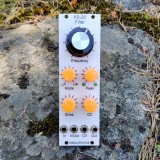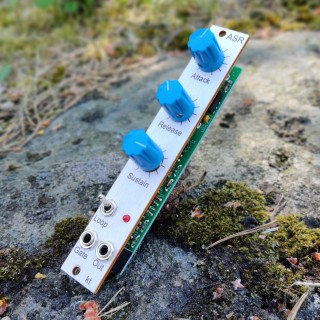This MS-20 style filter makes great basslines, with both strong bottom end which is not reduced at high resonance, and gnarly sound due to a nonlinear resonance path
The Korg MS-20 synthesizer had two filters in series, one high-pass and one low-pass. Internally, these filters are nearly identical, differing only in where the signal is fed to the filter. My KS-20 module contains one such filter core (of the later, OTA-based variant), and a front panel knob to smoothly transition between the two modes of the original MS-20 filters. It blends from a two-pole low pass, via a resonant allpass, to a one-pole resonant high-pass. Using two KS-20 modules in series the original MS-20 configuration can be created.
What sets the MS-20 style filter apart from other classic filter designs is a nonlinear resonance path, created by diodes or in this module LEDs. This nonlinearity is needed to avoid clipping when self-oscillating. More interestingly however, the nonlinear resonance makes the sound of the filter strongly depend on the amplitude of the incoming signal. This is where the drive knob comes in, allowing you to drastically change the character of the filter. At low drive settings, the filter is mostly linear and has a clean resonance. When increasing the drive level, the sound starts to "break up", and there is a sweet spot where the incoming sound and the filter resonance are competing with each other. At even higher drive level, the incoming signal starts to take over and pushes the resonance away, even when the resonance is set to self-oscillation.
This module is strongly based on the schematic published by René Schmitz, and all credit should go to him. In particular the choice to replace the string of diodes with an LED in the resonance feedback path was his. I did verify that this makes no notable difference to the sound. My additions were the variable mode control and drive knob.
The KS-20 is an 8hp eurorack module, using only through-hole components and a single PCB. It draws up to 25mA current per rail.
This module uses the LM13700N in PDIP format, for which Texas Instruments is ending support. It is still for sale, but sometimes harder to find in stock. For convenience I have some for sale with the option above.
 Finland
Finland












